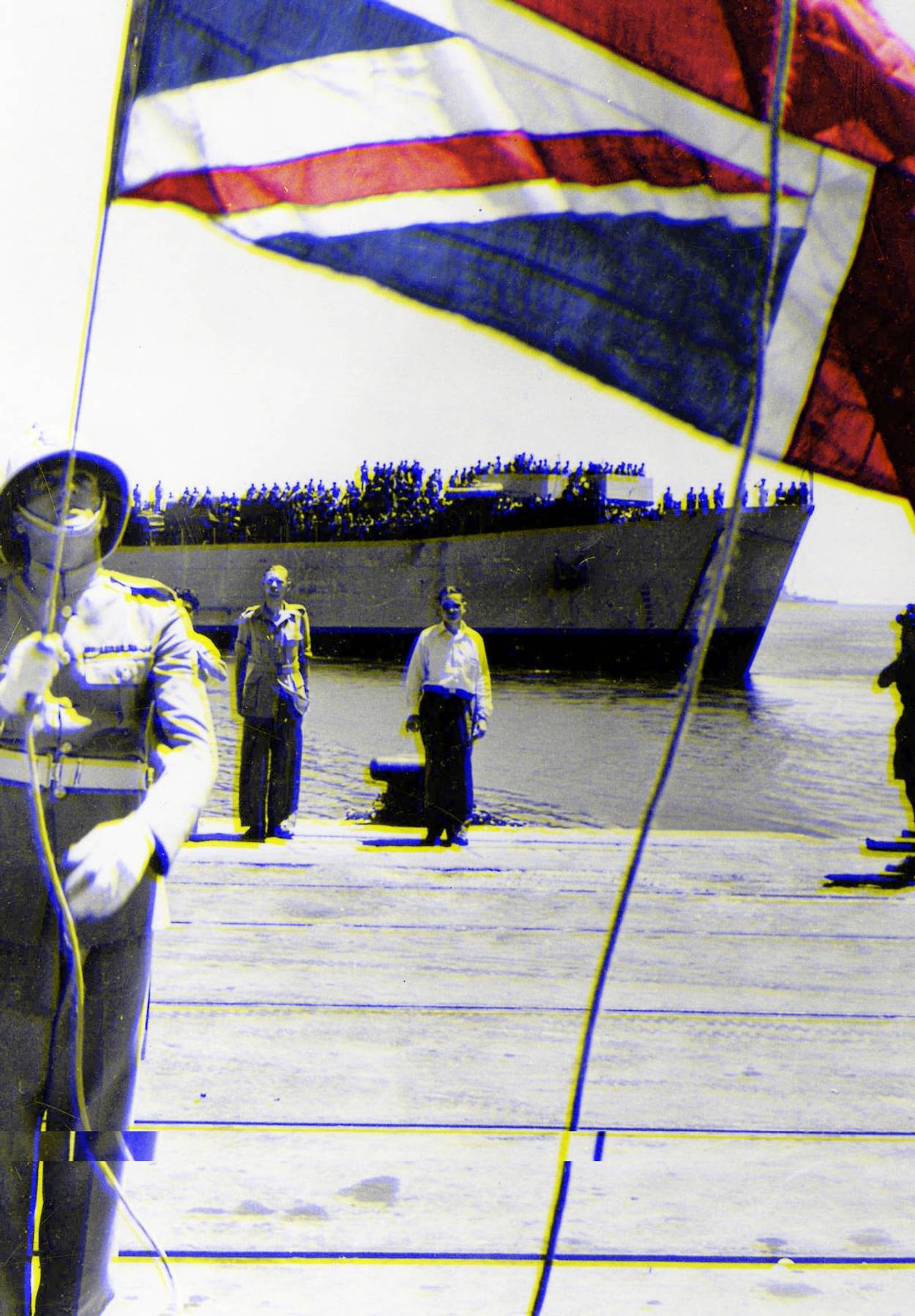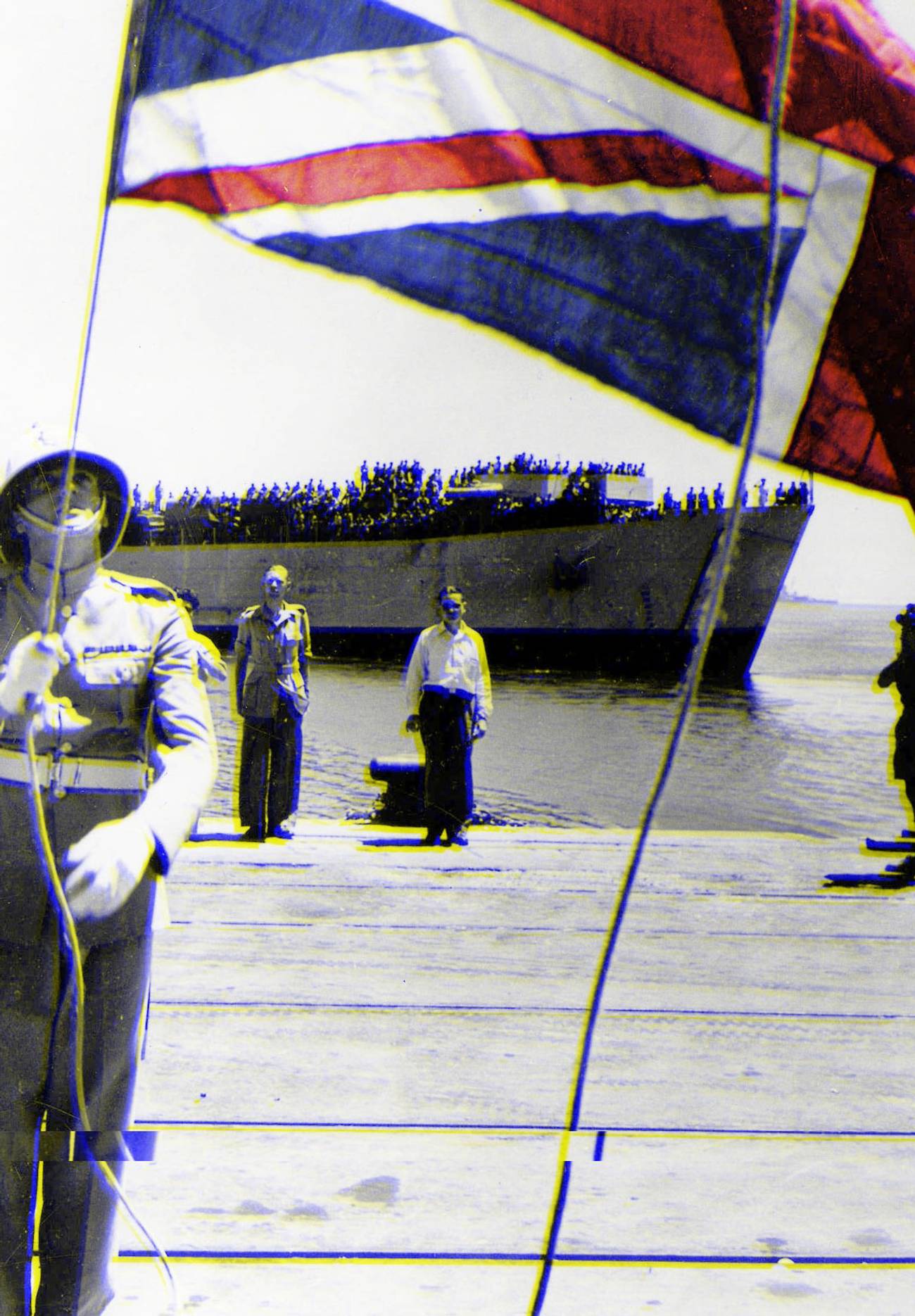What if the Zionists Lost?
A recent novel imagines a colonial Palestine in which the Jewish uprising failed and the British continued to rule




In Nissan Shor’s second novel, Mandate, published in Hebrew in 2021, the state of Israel was not established in 1948. The Israeli Declaration of Independence was never signed. Zionism was defeated and its leaders were executed.
Shor’s alternate history begins after a long series of terrorist attacks, with the British government upping the struggle against the Jewish community in Palestine. David Ben-Gurion, Menachem Begin, Yigal Alon, and Yitzhak Sadeh—the four big Zionist leaders—are captured by British detectives, taken to Acre Prison, and sentenced to death by hanging. In England, the prime minister, in cooperation with parliament, decides that Britain will maintain its control over Palestine for the years to come. King George VI of England declares Palestine an integral part of the empire.
This dramatic move is orchestrated in secret by the mysterious Paul Arnold, adviser and confidant to the king. Arnold is a religious and spiritual leader aligned with the Global Federation of British Israelites—a secret branch of Christianity that succeeds in taking over the halls of British parliament and the British political elite. The British Israelites believe that the British people are the descendants of the Ten Lost Tribes and that God had promised the Land of Israel to them. In their view the Jewish claim to Israel is false, and as impostors the Jews must be fought mercilessly.
In reality of course, the British ruled over Palestine for 25 years. The League of Nations decided that they would oversee the parts of the Levant which were formerly under Ottoman rule until those regions were deemed able to stand alone. The Mandate also gave Britain the responsibility for creating a Jewish national homeland in the region, in alignment with the Balfour Declaration from 1917. This meant that Jews emigrated from Europe to Palestine during the Mandate in hope of realizing the Zionist dream in the holy land of their forefathers.
Zionists regarded the Israeli Declaration of Independence as a victory. Severing their British ties and having an independent homeland was everything they dreamed of. But maybe the dream came true too soon.
When I was a late teenager in Israel, some of my friends and I put together a band. Before we played a single note, we designed T-shirts for the band. As devoted Anglophiles and lovers of British indie music, we sketched the Union Jack in permanent fabric markers on each shirt and wrote the slogan “Bring Back the British Mandate!” above it.
I didn’t know Tel Aviv-based writer, documentary director, and columnist Nissan Shor back then. But he and I also go way back, sharing an undying love for British culture. That’s why I wasn’t surprised to hear about the premise of his second novel. In the ’80s and ’90s, British music, cinema, TV, literature, and fashion were readily available to us, breeding a generation of Israeli Anglophiles. At times, the fantasy of living under British rule made our imaginations run wild.
Shor’s Anglophile tendencies are certainly what inspired this novel, but it’s more complicated than that. “For many years I’ve been noticing mentions of the British Mandate popping up in Israeli discourse,” Shor told me when we met to discuss the novel over a few rounds of lager. “Any time something goes wrong here, people say, jokingly, ‘Shame that the British left, I wish they’d return.’ Whenever people aren’t pleased with Benjamin Netanyahu, whenever there’s a political mess, or traffic jams, or nowhere to park or the trains aren’t running, people always say, ‘too bad the British left, they would have cleaned up this mess.’ I think it indicates a very real fantasy Israelis have, a real yearning for someone to come and clean up this place. I think this recurring joke is a testimony to the fact that Israelis don’t believe in their own ability to govern themselves. It also shows Israelis’ inability to accept Israel for what it is—a messy Middle Eastern country.
“The people who make these jokes aren’t aware of the history of the British Mandate or what actually happened here when the British ruled, but these jokes indicate something about the Israeli psyche, and the fantasy that salvation will come from outside.”
I asked Shor why he felt that Israelis don’t believe in their ability to govern themselves. Might it be a young country syndrome? Or something in the self-effacing Jewish DNA? Maybe it dates back to biblical times—the rift between Yehuda and Israel and the destruction of the temples over “sinat hinam” (baseless hatred.)

“I think that it has something to do with the fact that historically Jews were usually under foreign rule. There were only very few instances in which they governed themselves, and this always ended in catastrophe,” he said. “Israel is a country with an unstable democratic tradition, with no constitution, and I think that in the Israeli collective subconscious, we’re still not completely convinced that this young initiative can actually work. There is a certain dystopian feeling that all of this could potentially end at some point, whether at the hands of internal forces or external ones.
“Obviously there was also something convenient about living in the diaspora, in the shtetl. After all, Jews lived in exile for thousands of years and thrived. The existence of the State of Israel is a blink-and-you’ll-miss-it moment in the history of Judaism, so the fear that it might not be able to survive under Zionist sovereignty makes perfect sense.”
In 2018, Israeli historian, author, and journalist Tom Segev revealed in his biographical book, A State at Any Cost—The Life of David Ben-Gurion, that even Ben-Gurion himself tried to get the British to stay in Palestine a little longer. In fact, the national founder of the State of Israel tried to postpone the establishment of Israel by five to 10 years. According to Segev, the reason was that he feared that the Haganah—the Zionist paramilitary organization in Mandatory Palestine (which later became the IDF)—was not ready for the coming war.
“Even the biggest Zionist leaders didn’t want the Mandate to end so quickly,” Shor concludes. “They felt they needed more time. The belief was, and in many cases still is, that if the Mandate would have continued for 10 years longer, the country wouldn’t be so chaotic.”
So why didn’t the Brits stay longer? “They had no reason to stay,” Shor told me. “The Jewish terrorism and the Arab uprisings were becoming so extreme, and the British Empire was crumbling.” This is where, in Shor’s novel, the character of Paul Arnold and the British-Israel-World Federation come in. “Arnold’s beliefs give the British a reason to stay,” he explains.
Like in many popular works of recent years—Quentin Tarantino’s Once Upon a Time in Hollywood, for instance—Shor deliberately makes it difficult for the reader to tell apart which character or event in his novel is plucked right out of history and which is purely a figment of his imagination. Reading the book, chances are you’d think the British Israelites are completely bogus, but it turns out they actually exist. This strange doctrine, which has its roots in the 16th century, is based on the belief that the people of the British Isles are direct descendants of the Ten Lost Tribes of Israel and thus the exclusive heirs to the territory in question. According to them, neither the descendants of Ishmael—the Arabs—nor the Jews have any right to the land.
In the 19th century, British Israelite organizations popped up in the U.K. and the U.S., and in 1919 the British-Israel-World Federation was founded in London. The organization peaked in popularity in the early 20th century and still exists today.
I won’t be as blunt as to call the federation a cult, although nothing casts suspicion to the fact that they indeed are a cult more than this sentence from their official website: “The British-Israel-World Federation is not and never has been a cult.” The fact that their claim is generally believed to be based on poor research and unsound evidence doesn’t do them any favors either. Oh, and historically, it’s worth adding that they have nothing to do with the British Mandate. That part was made up by Shor.
In the book, the British-Israel-World Federation aims to take over the Land of Israel, turn it into the territory of the British Israelites, and eventually eliminate all Jews. To do so, they place Avinoam Tobolsky—a young, dandy, gay Jew, who is an avid fan and admirer of British culture and easily manipulated—at the head of a puppet government. The idea is to offer a semblance of legitimacy to their plans for the eventual takeover and expansion of the regime.
The Brits also limit the number of Jews allowed to live in the country and deport Arabs to other Arab countries, Ashkenazi Jews are sent back to Europe, and Mizrahi Jews aren’t even allowed into the country. Arnold’s plan, which feels historically familiar, is to fill the land with Brits from all over the empire.
“The reality beneath the cultured facade of colonialism is that it causes cultural destruction,” Shor explained. “Religious destruction, historical destruction, and the destruction of people. The polite, cultured white man, with his amazing literature and poetry and beautiful suits, actually destroys.”
This destruction has many forms and is felt to this day. “Let’s not forget that the people who are to blame for the mess the entire Middle East is in now are the British and the French,” Shor says. “The Sykes-Picot Agreement of 1916 was totally unfounded. They just came with a map and rulers and divided the Ottoman Empire, without taking into consideration tribes who might not want to be united or areas that cannot be divided. This partition made no sense, and it is the basis for all the trouble in Iraq, Syria, etc. And at no point did they take any responsibility for this.”
But the dangers of colonialism weren’t obvious to some back then, just as they aren’t obvious to some today. In Shor’s novel, the Romanian-born character Tobolsky, who found himself immigrating to Palestine against his better judgment, believes that British culture and dandyism will save him from this provincial and barren place. In an attempt not to let the country change him, he truly believes that by propagating British manners, fashion, and culture, he’ll change it for the better. “But he learns the hard way that there are forces in the world that are much stronger than the force of culture,” Shor says. “He learns that religion, national identity, and violence are much stronger forces. The drama is the fact that Tobolsky is so misguided. He thinks that beauty will save him. Today this sounds ridiculous and even dangerous, especially if we consider that the fetishization of beauty is at the core of fascist thought of the early 20th century.”
And while Tobolsky represents the pro-Mandate Jewish citizens of Palestine, the Jewish Zionist resistance rears its violent head in the book as well. Shor integrates real historical figures into his story, including Avraham Stern (alias Yair), the leader of the Zionist paramilitary organization Lehi. In the novel, Yair isn’t murdered by the British colonial Palestine Police Force in 1942, as he was in real life. Instead, he survives the assassination attempt and becomes the most wanted terrorist in the country, orchestrating many terrorist attacks, including engineering the first ever Jewish suicide bombing.
Shor remembers when Ehud Barak said in the late ’90s that if he were born a Palestinian, he would have probably joined a terrorist organization. “Today no Israeli politician would have the guts to say something like this,” he added, “but the Israeli political discourse was less extreme back then. He got away with it and he even got elected as prime minister after that. Anyway, this was a rare instance in which an Israeli admitted to understanding the motivation of the other side. I think my book shows that all people have the same motivations. When you find yourself in a situation where you are ruled by another nation, you react in an extreme way. This symmetry is actually trivial and banal.”
If occupation equals destruction, and there is no difference between the Jewish terrorists of Mandatory Palestine and the Palestinian terrorists of recent times, Mandate can be read as a political allegory to the Israeli occupation of the West Bank. But Shor insists this is only one possible interpretation. “I believe this novel is politically ambivalent,” he said. “I think that it can be read as an anti-colonialist novel that deals with the cruelty of the British Empire. Or with the fact that Jews aren’t any more moral than Palestinians.”
Of course, the book’s imaginary world in which the British never left the country also turns out to be pretty tragic. The British were a foreign element that wasn’t supposed to be here in the first place, and in Mandate the fact that they stay leads to violence and disharmony too.
“Some interpreted the book as left-wing propaganda, but I don’t see it that way, and my motivation for writing it wasn’t at all political,” said Shor. “By the way, I was surprised to find out that it gained popularity among extreme right-wingers. They were actually delighted that I killed off Ben-Gurion, whom they despise, and Menachem Begin, whom they consider a traitor for giving back Sinai to Egypt.”
Dana Kessler has written for Maariv, Haaretz, Yediot Aharonot, and other Israeli publications. She is based in Tel Aviv.